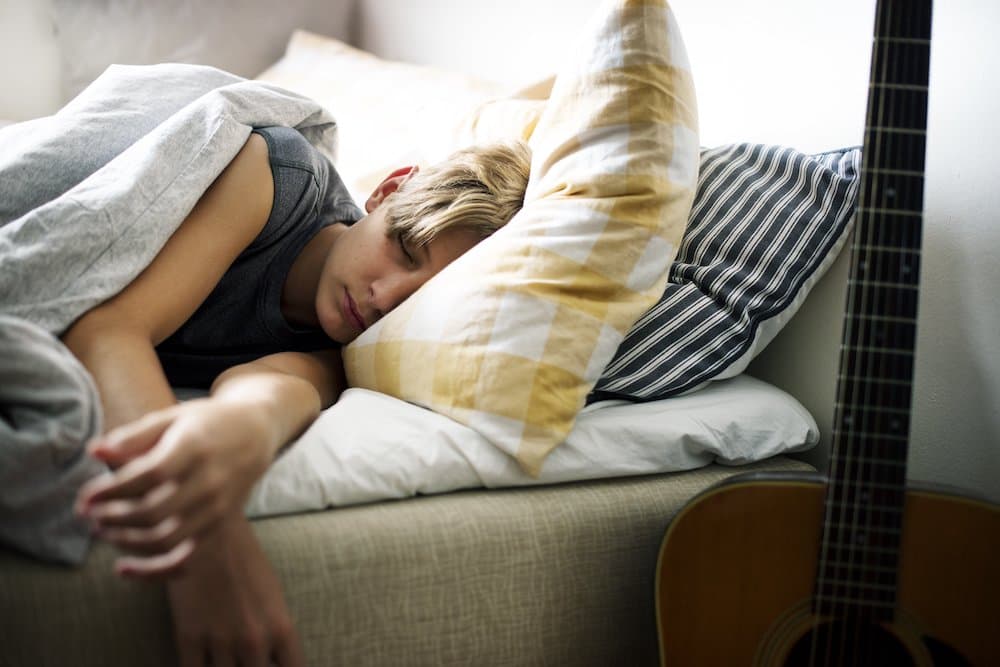
2025-11-21T14:10:25
How to Prevent Gestational Diabetes
- Family Medicine
- Internal Medicine
- OB/GYN
January 17, 2019 | Family Medicine
Specialties:Family Medicine • Internal Medicine

Did you know teenagers are actually wired to stay up late and sleep late? The American Academy of Pediatrics (AAP) notes that sleep cycles shift by up to two hours at puberty. Early school bells, late afternoon sports, homework schedules and social media also contribute to teens’ lack of sleep.
According to the National Sleep Foundation, teens who get the recommended 8.5 to 9.5 hours of sleep on school nights reduce their risk of obesity, depression and even car accidents. Good sleep also contributes to higher grades and test scores. However, 92% of teens need more sleep, according to research published in the Journal of Adolescent Health. Try these six tips to help your child get much-need rest.
The glowing screens of computers, smartphones, tablets and televisions can prevent healthy sleep. Try making bedrooms screen-free zones after a certain hour or encouraging quiet activities, like reading and journaling, before bed.
You may get better results from teens if you practice what you preach. Try setting up a family charging station in a common area where everyone can plug in their devices at an agreed-upon time.
Going to sleep and waking up around the same time each day contributes to healthy sleep. While many teens stay up until all hours of the night and sleep until noon on the weekends, this dramatic schedule shift makes it difficult to make it to the bus stop on Monday morning. To determine the ideal bedtime, count backward by ten hours from the time your teen needs to wake up and stick to it each day.
Beverages with lots of caffeine, including soda, coffee, and energy drinks, are not recommended for teens. Teens who do drink coffee or tea should refrain from having a cup after lunch. Energy drinks have much higher levels of caffeine than coffee and sodas—discourage your teen from choosing these items.
We get sleepy when our brain releases a substance called melatonin. Teens don’t tend to get tired until 11 p.m. or even later, which can conflict with early-morning high school schedules. Over-the-counter melatonin supplements can help your teen feel tired earlier, allowing him or her to get a few extra hours of sleep before the alarm clock goes off.
Remember when you used a routine to lull your toddler to sleep? A warm shower or bath, calm music and a dark, soothing room will work for your teen, too. These cues help “trick” the brain into getting ready for sleep. By contrast, texting and online videos keep the brain active, which makes it difficult to fall asleep.
Many of today’s teens are overscheduled with activities. If your teen often stays up late to do homework, it might be time to drop a sport or club commitment. Time management is a skill that will serve your teen well in college and beyond.
If you don’t think your teen is getting enough sleep after trying some of these methods, make an appointment with his or her doctor. Some health issues, such as anxiety and sleep apnea, can make it harder to get enough sleep.
“10 Proven Tips To Make Your Sleep Deprived Teen Sleep Better.” American Association of Sleep Technologists.
“How to Help Teens Get More Sleep.” Child Mind Institute.
“How to Help Your Teen Get More Sleep.” Lifehacker.
“10 Tips to Help Your Teen Sleep Better.” University of Michigan Health.
“Go to Bed! How to Get Teens to Get Enough Sleep.” WebMD.

WRITTEN BY:
The Live Better Team

2025-11-21T14:10:25

2025-11-03T11:32:24

2025-10-21T11:51:52

2025-08-20T16:07:59
This information is not intended to replace the advice of a medical professional. You should always consult your doctor before making decisions about your health.